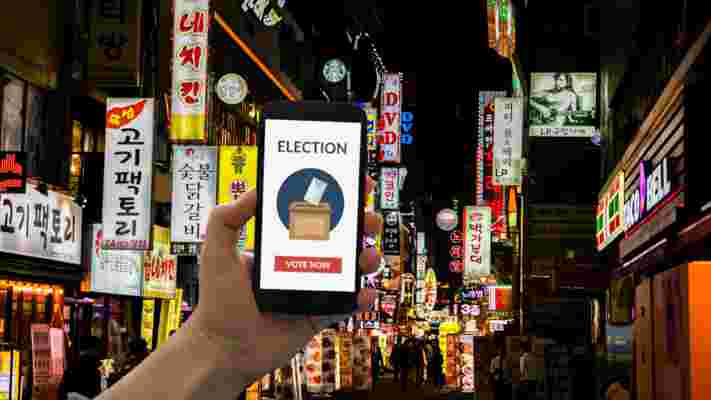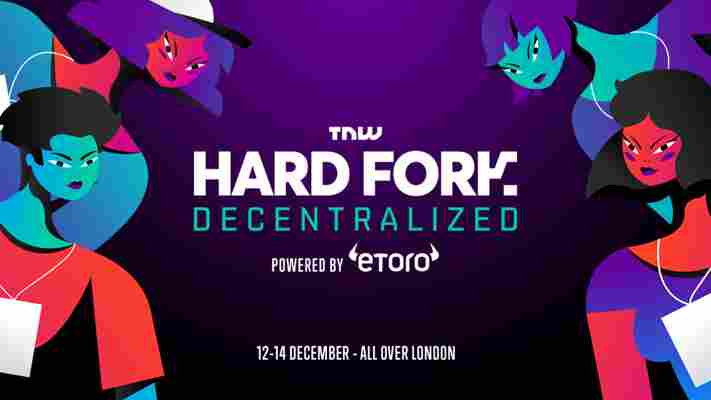Putting democratic voting on the blockchain is becoming one of the technology’s most divisive applications, but that isn’t stopping South Korea from pushing ahead with a blockchain-based voting system trial.

The country’s National Election Commission (NEC) and its Ministry of Science and ICT have confirmed they’re developing a blockchain-based voting system, reports ZDNet .
The NEC actually used a non-blockchain-based online voting system way back in 2013, known as K-voting. Trust in the system remains low due to hacking and fraud concerns.
Reports state that the latest system will use blockchain to authenticate voters and save votes. The South Korean government believes this will increase transparency and security – presumably to improve trust in the digital voting system.
The trial is pegged to start next month and will initially be used to gather responses for surveys conducted by Seoul National University’s Blockchain Society and Korea Internet and Security Agency.
It will be a while before this system is used for official democratic voting, the NEC will make a decision following the results of the trial.
South Korea isn’t the first to use blockchain to develop a voting system , and it’s taking a more measured approach. Which hopefully means the country will address the challenges – like voter authentication and security – associated with this application of blockchain.
5 bite-size Bitcoin factoids to beef up your cryptocurrency knowledge
Bitcoin celebrated its 10th birthday earlier this year.

The cryptocurrency is technological feat and while its inner workings are often difficult to understand, or explain, there are a few interesting facts every enthusiast should know.
We’ve rounded up some of the most interesting facts about Bitcoin.
1. Satoshi Nakamoto is very rich
The identity of Bitcoin‘s inventor, or inventors, remains a mystery but we do know they are very rich.
It’s estimated that Satoshi Nakamoto , the pseudonym used by Bitcoin‘s creator, has mined and owns around 980,000 BTC , which is equivalent to approximately $ 6.9 billion at the time of writing.
2. The US government owns LOTS of Bitcoin
Cryptocurrencies such as Bitcoin may have been created to circumvent governments and their reach, but the truth is that at one given time, the FBI had the second-largest Bitcoin wallet after Satoshi Nakamoto.
In late 2013, the FBI shut down Silk Road, an online drug marketplace, and began seizing Bitcoins belonging to Ross Ulbricht (also known as Dread Pirate Roberts), the operator of the illicit website.
At the time, the seizure resulted in a lot of discussion about the cryptocurrency‘s future and saw the FBI control more than 144,000 BTC .
3. No private key, no Bitcoin
If you were to forget about your credit card pin (guilty!) you can easily retrieve your money by contacting your bank and proving your identity. Right?
Well, when it comes to Bitcoin, it’s not so easy. If you misplace your private keys, you’ll lose all your coins.
In fact, back in 2013, IT worker James Howells lost 7,500 BTC which, at the time, were worth approximately $127 million. He claimed that he accidentally threw away a hard disk, which contained the Bitcoin private keys he had mined overt he past three years.
4. Bitcoin supply is limited
Central banks control the creation and supply of money as the see fit.
However, Bitcoin has a limited and finite supply of 21 million.
Currently, there are more than 17.7 million Bitcoins in circulation, and the last coin is due to be mined in 2140.
5. No, Bitcoin can’t be banned
It doesn’t take much to see why governments don’t like Bitcoin, but the reality is that the cryptocurrency can’t be banned, only regulated.
The network is designed in such a way that as long as you have an internet connection and a Bitcoin wallet, you can buy and exchange the cryptocurrency.
So, there you have it. If anyone were to ask you about Bitcoin tomorrow, you should now be able to recite a few interesting facts off the cuff.
The top 3 blockchain trends we’ll dive into at Hard Fork Decentralized
Hard Fork Decentralized is just around the corner, and we’re looking forward to welcoming some great speakers to the stage. At The Exchange, our very own meeting place thanks to our official venue partner CitizenM, we’ll host in-depth panel discussions and roundtable sessions.

Let’s take a look at some of our headliners:
Yoni Assia, CEO of eToro
Yoni founded eToro in 2007 with the aim of making trading and investing in cryptocurrencies accessible to everyone. With the core value focusing on simplicity, eToro has boomed since its birth and is now one of the most well-known cryptocurrency trading platforms.
Back in May, Yoni spoke at our flagship TNW Conference. He discussed how the future success of blockchain and cryptocurrency rests with millennials, as they are losing trust in governments and control a large amount of the world’s wealth. Simply put, it’s integral to get millennials down with the blockchain (which reminds us: we’re offering an 85-percent discount on tickets to Hard Fork Decentralized to under 30s).
He also mentions that investment regulation is integral to ensuring that blockchain is universally adopted.
You can watch his full talk right here:
Marcus Swanepoel, CEO of Luno
Luno is a virtual wallet that aims to make it easy for beginners to buy and store cryptocurrency. With its own resource portal, it tries to provide a hands-on approach to learning, by showing users how to select and handle their own cryptocurrencies.
Marcus has written a series of articles that discuss the evolution of banking with the growing rise of cryptocurrency, and how the way we handle money will radically transform faster than we think.
Kavita Gupta, Founding Managing Partner of ConsenSys
Kavita heads ConsenSys ’ VC-hedge fund which invests in upcoming blockchain solutions. She also spoke at our flagship TNW Conference back in May, and discussed how she identifies promising projects to invest in.
You can watch her full interview (with our very own Mix ) right here:
So there you have it! Three trends we’ll explore at our blockchain event: investment, banking, and adoption.
We can’t wait to have these speakers bring their expertise to Hard Fork Decentralized . They’ll share their views on the biggest opportunities and challenges the industry currently faces – and you can join the conversation by registering now for our blockchain event!
See you there?











